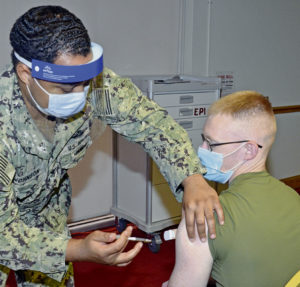
The sheer volume of COVID-19 infections makes the virus and its variants a real challenge, Dr. Anthony Fauci, director of the National Institute of Allergy and Infectious Diseases, told a Blue Star Families forum in a virus update Jan. 19.
Speaking virtually along with Army Lt. Gen. Ronald J. Place, director of the Defense Health Agency, and Air Force Maj. Gen. Paul A. Friedrichs, command surgeon of the Joint Chiefs of Staff, Fauci was the first to address military and veteran communities about the omicron variant of COVID-19.
“We’re dealing, as we all know, with an unprecedented outbreak with COVID-19 that continually challenges us with new variants,” Fauci said. “We’ve gone from the original strain through alpha, beta and delta. And now we’re dealing with omicron, which is very unusual, because of this extraordinary capability of spreading so efficiently from human to human.”
The United States still has a record number of COVID-19 cases and hospitalizations, and the nation has about 2,000 deaths per day from the virus, he added.
But Fauci noted that by mid-February, various states should start to show signs of turning around and begin to come down in their virus case numbers and hospitalizations.
“There are some fundamental tenets of public health with [regard to] COVID that many families are already practicing, and that is to get vaccinated,” he said, adding that boosters should be obtained, too.
Fauci also said it’s important to wear well-fitted, high-quality masks consistently indoors when around other people. “The other thing that you could do is when you are engaged in social interactions, … you might want to take the extra step of getting a rapid [COVID-19] test, “he said, adding that masks clearly now have shown to be very effective in not only protecting people from getting infected, but protecting people from transmitting the virus to others.
The renowned physician called COVID-19 statistics stunning.
“The latest statistics are that an unvaccinated person has a 10-times greater chance of getting infected, a 17-times greater chance of getting hospitalized, and a 20-times chance of dying compared to a vaccinated person,” Fauci said. “Those statistics alone should get you to be really enthusiastic about protecting yourself and your family.”
He noted that when people who are infected with COVID-19 get vaccinated afterward, they have an extremely high level of protection. And, he added, “if someone gets vaccinated and boosted, and they get some breakthrough infection, the level of that subsequent protection is very, very high.”
“The great news in all of the challenges of this pandemic is that our military has continued to defend our nation for the last two years, in spite of all of the challenges that we face,” Friedrichs told Blue Star Families. “And in large part, that’s due to you all at home, making it possible for those of us who are still in uniform to do what we have to do.”
The Joint Staff surgeon said the Defense Department is stepping up again by deploying about 400 people last week to help hospitals around the country, another 500 are deploying this week, and 500 more military medics are also going out shortly behind that wave to help hospitals all over the country.
“We know that during this great need and challenge our country is facing, it’s the DOD who the country turns to for support,” he said.
“The most important thing that we ask you all to continue to do is keep faith with your service members if you’re a military family. This [pandemic] happens once every 100 years. Hopefully, we’ll never see it again. But please know, we all want this to be over as soon as possible. And you’re helping us when you get vaccinated. You’re helping us when you make sure that kids are able to go to school; you’re helping us as we fight through this latest enemy that we face,” Friedrichs said.
“We ask a great deal of our military families. We’re asking even more now, and we know that,” he told families.
Even though the DOD community has been affected with COVID-19 cases and hospitalizations as much as the civilian sector, consistent with national trends, a much smaller percentage of inpatients are requiring intensive care unit care, and that’s good news, Place said.
“The point is, the vaccines work,” the general added. “If you listen to nothing else, not only for yourself, but for your families and your community, I strongly urge everyone to get vaccinated and get a booster when appropriate.”
One of the first things that Secretary of Defense Lloyd J. Austin III communicated during his first day in the Pentagon was that the COVID-19 pandemic was a national security threat, and the DOD would be part of the whole-of-government response, Place noted. “And I’ll acknowledge that our military medical personnel have answered, and continue to, answer that call,” he said.


